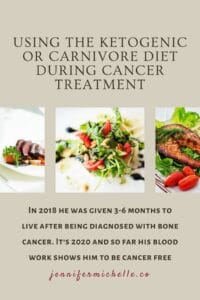I earn a small commission via affilate links at no extra cost to you.
This isn’t a topic I typically write about but as you likely know, we’ve all been touched by cancer. I’ve heard more than once that people who are battling cancer are often told to eat whatever sounds good. There’s little attention paid to what these calories are made of. We live in a world where cancer is now the number one cause of death by disease in children. What if we paid attention to what we feed cancer patients and kids for that matter. Instead of telling people to eat whatever sounds good, what if we focused on nutrition and less sugar. What if a ketogenic or carnivore diet could help a person fight cancer, if not get rid of it completely.
As I said we’ve all been touched by cancer, for me it was watching my grandmother gradually die over the course of 2 years when I was a kid. Grandma Bea was my favorite person. Her house was a magical place. Not only did she work for a toy factory but there was always an abundance of delicious food. She was born in Kentucky so naturally, it was homemade comfort food: biscuits and gravy, chicken and dumplins’, homemade pies, green beans with taters and bacon, you get the gist. I get that I was just a kid at the time but I often wish I could go back in time and help her. This happened in the ’80s and she had both chemo and radiation for her bone cancer. During those two years, she went from an incredibly strong person who didn’t take flack from anyone to a shell of a person with a severely curved spine.
Remembering Grandma Bea
She was before her time. My grandfather used to “collect” pretty much anything you could buy at a flea market: teacups and saucers, glass chickens, hammers, hammer handles, and oh my word the clocks. There were 3-4 clocks in every room and he could always tell you which ones kept the best time. Of course, the joke was that if there were ever a bomb threat we’d simply have to leave because the whole place ticked. One day my grandmother was drying some dishes that he had acquired at the flea market and one slipped from her hand and broke. He started running his mouth about how she needed to be more careful, and he spent good money on those dishes, yadda yadda… She picked up the next dish to dry it and his mouth kept running so that dish also hit the floor. As he kept running his mouth she broke all of the dishes.
There was also the time we had been out shopping and when we returned grandpa said: “I reckon you all will stay out all day and let a feller starve.” Without missing a beat she turned on her heel and said: “any grown man that can sit in front of a refrigerator full of food and starve ought to.” So if I ever throw any sass your way I have to say that I come by it naturally.
The Metabolic Approach To Cancer
Last summer I went to the Ancestral Health Symposium where I met Dr. Nasha Winters and watched her speak about cancer. She blew my hair back with science. What I took away from the lecture was that your survivability from cancer relies heavily on your oncologist. If your oncologist has an attack and destroy approach with different forms of chemotherapy you may want to consider finding a new one. While chemotherapy can kill some cancer cells it actually makes other cancer cells stronger.
You can watch Dr. Winters talk below:
Her book is called The Metabolic Approach To Cancer:
The universal message I’ve gotten from the experts like Dr. Winters & Dr. Cate Shanahan is that one of the biggest changes you can make to fight cancer and also prevent it is to remove the glucose. Cancer loves sugar and the modern diet is loaded with it. It’s not just added sugar it’s also the polyunsaturated vegetable oils and grains in our everyday diet. This is one of the many reasons I help people find their way to the low carb lifestyle. It’s the most anti-aging, anti-cancer thing you can do. Of course switching from an industrialized diet to a ketogenic or carnivore diet overnight doesn’t work for many. Your body is accustomed to running on glucose and when you suddenly try to switch fuel sources you’re going to experience the carb flu. Then there are others who are taking medications for blood sugar control, or they have a history of calorie-restricted diets, or they have quite a bit of insulin resistance. For those populations easing their way to low carb and staying there simply takes time. It’s not a quick fix, it’s a lifestyle change, but change is possible.
The Carnivore Diet For Cancer
The podcast episode below is long but it’s a good one. Dr. Al Danenberg is a fellow primal health coach and nutritional periodontist. In 2018 he was given 3-6 months to live after being diagnosed with bone cancer. It’s 2020 and so far his blood work shows him to be cancer-free. After their chat about his cancer journey, they begin talking about tooth and gum health. You’ll actually hear him recommend brushing your teeth with honey. It’s a long chat, but it’s a good one that’s filled with things you’re not likely to hear in the mainstream media.
One of the primary reasons I became a coach is because I have worked out how much of an impact food has on our overall health. Think about it, our body is one biochemical reaction after another. If you’re not feeding it what it needs how can it work properly?
Why The Carnivore Diet For Cancer?
The carnivore diet is the ultimate elimination diet. If we were to take your body and throw it on the grill you are essentially made of red meat. When you eat red meat all of the nutrients translate. That is, there’s no funky biochemistry to turn them into something your body can use (often requires nutrients and resources). One of my favorite examples is carrots. The government allows the verbiage that carrots contain Vitamin A which is false. Vitamin A is a fat-soluble vitamin and the last time I checked carrots aren’t loaded with fat. Carrots contain beta carotene that your body can convert to Vitamin A but the process is pretty inefficient. Your ability to make Vitamin A from carrots depends on your DNA. For some, the conversion of beta carotene to Vitamin A can be as low as 3%.
If you’ve followed any of the carnivore docs you’re likely questioning everything you’ve ever heard about vegetables. I share my experiences with the carnivore diet here, here, and here. The Carnivore Code is the best book on the subject I’ve come across that gives you all of the detailed science. In the book, you’ll learn why broccoli may not be your friend and how the oxalates in your kale smoothie may be making your health worse. What I’ve learned for sure in everything I’ve read is that we really know squat when it comes to human health and nutrition. The one universal truth that everyone does agree on is that we shouldn’t eat fast food or processed food. (both are loaded with vegetable oil, sugar, grains, and other artificial nonsense and additives) On a personal level, I’ve made greater gains in my health journey by focusing on red meat more than anything else. Plus, there’s the fact that it makes me feel amazing.
I am making a major change in my diet. As with my entire unconventional cancer journey, I continue to experiment and think “outside of the box”. My current research is suggesting that there are potential benefits to replacing my Paleo-type diet with the Carnivore Diet in my Daily Cancer Protocols. While there is no peer-reviewed published trials which I could find where the Carnivore Diet has been designed to treat cancer patients, there are anecdotal reports and case studies that are impressive. The Carnivore Diet is similar to a ketogenic diet but with all fruits, vegetables, nuts and seeds removed.
A ketogenic diet reduces carbohydrates and increases healthy fats to a level where the body’s metabolism shifts away from burning carbs to burning fat and ketones for energy. The Carnivore Diet requires eating only wild-caught and pastured animals from nose-to-tail. Since the Carnivore Diet completely eliminates all plants, it importantly avoids the abundance of antinutrients (i.e. lectins and oxalates) found in plants.
You can find more research on Dr. Al’s blog along with the cancer protocol that he used himself.
The Carnivore Diet Eliminates Anti-Nutrients
After my autoimmune paleo journey and experiencing an autoimmune flare after a day of skiing I went back to the drawing board. It didn’t sit well with me that I ate better than most people yet a day of skiing knocked me on my butt for a week. That’s when I came across Dr. Gundry and The Plant Paradox where he talks a lot about lectins. For those who don’t know what a lectin is: gluten is a lectin. Lectins exist in all grains, legumes, nuts, and seeds and they exist to resist digestion. Think about it, a seed’s job is to make it through the digestive tract unaffected so that it can be planted in a heaping pile of compost. Dr. Gundry takes it a step further and addresses the seeds inside things like cucumbers and zucchini, and the lectins found in produce that’s picked before it’s ripe.
Following some of the carnivore docs like Shawn Baker, Georgia Ede, Stephen Hussey, and Paul Saladino I began to question fiber and other plant anti-nutrients. What I know for myself is that nightshades, lectins, and oxalates (many plants have one or more of these compounds) guarantee that I’ll have joint pain. Depending on the food you can also throw in headaches, bloating, fatigue, and diarrhea along with joint pain. I wrote a blog post a while back about plant compounds and joint pain. In some ways, I feel lucky because if I eat something that doesn’t work for me I physically feel it. It also makes me scratch my head – if vegetables are so healthy why do they produce less than ideal effects for me?
One caveat is that when eating a carnivore diet you want to buy animals that were raised in their natural environment. That is, cows that exclusively ate grass, chickens that foraged for bugs (chickens aren’t vegetarians), and pork that has also been raised on a pasture. When animals eat their traditional diets they produce fats that are high in anti-inflammatory omega 3’s. Conversely, animals that are fed grains not only end up with lectins in their meat but they’re also high in inflammatory omega 6’s. Many believe that organic is the best but unfortunately organic animals are typically still fed grains. In my book, organic is the second best.
Health Benefits of Intermittent Fasting
When you become fat adapted and begin following a ketogenic or carnivore diet it makes intermittent fasting so much easier. Glucose drives hunger so when you jump off of the sugar train and your body remembers how to use fat and ketones for energy, intermittent fasting becomes simple. What’s the point of intermittent fasting? When you can go an extended period of time without food it allows the cells of the body to do some housekeeping and repair themselves through a process called autophagy. Conversely, when glucose is always abundant it sends a signal to your cells to hurry up and divide – the very definition of cancer (cells that divide uncontrollably). By pulling the energy source (glucose) that encourages this rapid cell division you essentially cut off the lifeline to the cancer cells. There have been so many times I wish I could go back in time and knock that fast food sandwich and “nutrition” drink out of grandmas hand.

Originally posted on July 13, 2020 @ 13:01






1 thought on “Using The Ketogenic or Carnivore Diet During Cancer Treatment”
Comments are closed.